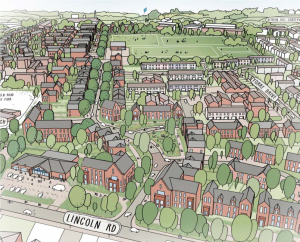Maggie Rafalowicz, Director at Campbell Tickell, discusses lessons from regeneration.
Regeneration is all about improving the quality of life in an area that has been in decline, without displacing the existing residents and communities – unless they would welcome the opportunity to move on. If there is one thing I have learnt from years of working in regeneration, it’s that there often isn’t a single community and a single set of views. Regeneration takes a long time.
You need to spend time understanding the physical and financial constraints and opportunities; getting to know the different parts of the community, be they residents, voluntary groups, politicians, statutory services or businesses; and exploring potential funding options. Given that regeneration takes many years, those options will change with time, governments and market conditions. You need to find partners who will go the distance and deliver a win-win solution for all involved and you need a vision that binds it all together.
1. Tough choices
Residents understand that decisions are not straight forward – they know better than most about making tough choices when it comes to spending money. They don’t want undeliverable promises and glossy brochures. They want and deserve respect, transparency and honesty – even if you are telling them things they might not want to hear – you can get to a stage where there is an understanding and collective ownership of plans to move forward.
2. Yorke Drive
Yorke Drive is a 1960s estate in Nottinghamshire, which has suffered from lack of investment. It is close to Newark Northgate station but cut off by inward-looking design and a poor road network. The estate had already gone through a masterplan process, which had stalled with the last financial downturn.
Newark and Sherwood Council took advantage of a Ministry of Housing, Communities and Local Government (MHCLG) regeneration fund to see if regeneration could be kick-started. Campbell Tickell was appointed to produce a new masterplan and financial model. We set up a local project team and began to identify and assemble information, establishing contacts with key players.
We produced a consultation and involvement strategy to support the master-planning and planning application process. We put together a design and technical consultancy team – architects (HTA), cost, transport, landscape, valuers – and a financial viability appraisal model that considered the overall financial position and scope for cross-subsidy, impact of demolition, rehousing, tenure mix, phasing, cashflow and the housing revenue account.
We also consulted with Homes England and MHCLG on potential financial support. Alongside the technical and financial essentials, we worked closely with residents, getting to know them and collating their views. We set up a residents panel, organised drop-in sessions, survey and feedback mechanisms, and with HTA, held workshops and public exhibitions so residents could contribute to and refine the masterplan. We produced monthly newsletters and used social media (Facebook, Twitter, and the council website) to keep the community updated. While not all residents and stakeholders were satisfied, the overwhelming majority were happy with the proposals.
3. First steps
Planning has now been approved. The masterplan proposes selective demolition and redevelopment of the existing estate, building up to 320 new homes to modern space standards for rent and sale. As part of the phased approach, replacement homes for those impacted by demolition and enhanced public sport facilities will be delivered in phase one – the first step towards improving quality of life and creating a better and safer place to live. The next stage has begun and the council is in the midst of selecting a development partner to deliver the masterplan. Importantly, the residents will continue to be involved in this process.
To find out more, contact Maggie Rafalowicz : maggie.rafalowicz@campbelltickell.com
This article also appears in CT Brief- Issue 43



